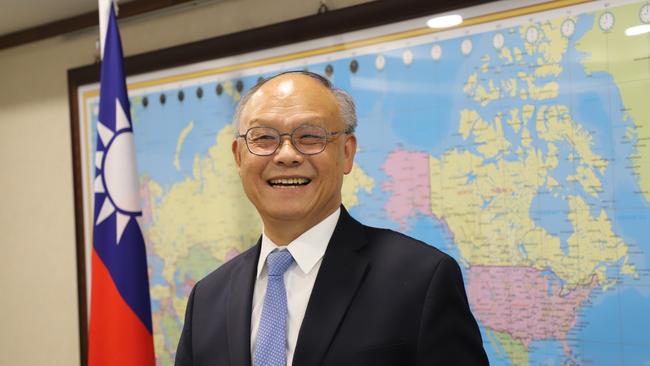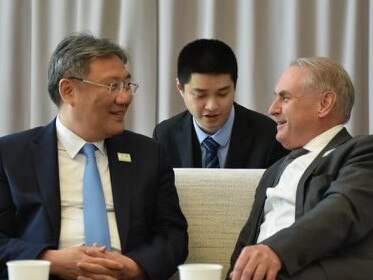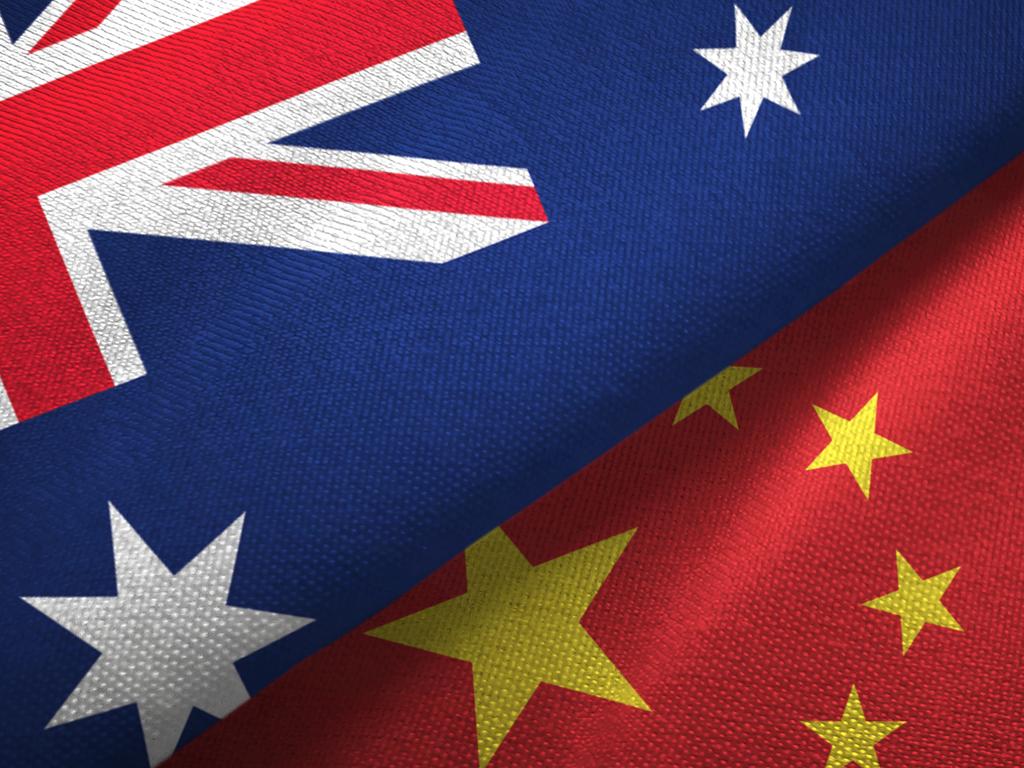‘Canberra won’t bow to Beijing’ on Taipei trade pact bid
Taiwan’s top trade negotiator says he ‘cannot imagine’ Australia will fold to pressure from Beijing and block Taipei’s membership.

Taiwan’s top trade negotiator says he “cannot imagine” Canberra will fold to pressure from Beijing and block Taipei’s bid to join the Comprehensive and Progressive Agreement for Trans-Pacific Partnership, which looms as a major test of Australia’s recently “stabilised” relationship with China.
Both China and Taiwan are pressing Australia and the 10 other CPTPP members to allow them to respectively join the giant trade pact Canberra helped create.
Taiwanese Trade Minister John Deng told The Australian it was inconceivable to him that Australia – a champion of trade liberalisation since the Hawke era – would “compromise” on Taipei’s application to join the giant trade pact as Beijing presses CPTPP countries to block its decades-long rival.
“I cannot imagine Australia will compromise … That would be such a big change from (Australia’s) past 40, 50 years (of) practice and policy,” he told The Australian in an interview in his Taipei office.
“Australia is one of the leaders in the international trade community. They are a strong advocate for the rules-based (trade order). Everybody knows, in the WTO, Australia is one of the leaders. So we hope that they can continue this spirit and consider Taiwan’s case.
“The Australian government knows Taiwan is a good market. It’s stable. There’s no political interference. I think when the time comes the Australian government will make the right decision.”
Taiwan’s government – which applied for membership in 2021 – argues that expanding the 11-country agreement with economies that can meet the pact’s rigorous standards will help improve the international trading system, even as the World Trade Organisation is crippled by US-China geopolitical tension.
Trade experts say Taiwan, a fulcrum in the world semiconductor industry and Australia’s fourth-biggest trading partner, is far closer to meeting the CPTPP’s standards than China, which has increased support for its already favoured state-owned enterprises during Xi Jinping’s reign.
“That’s the chance CPTPP shouldn’t give up,” Mr Deng said.
China also applied to join the trade group in 2021, during the height of its trade coercion campaign against Australia and a day after the AUKUS security partnership was announced.
President Xi’s government is putting huge pressure on the Albanese government to support its CPTPP application.
Entry to the trade pact requires unanimous support of all members, giving Australia useful leverage as it negotiates an end to China’s unofficial and official trade sanctions, and presses for humane treatment for Australians Cheng Lei and Yang Hengjun who both imprisoned on opaque national security charges.
Chinese Commerce Minister Wang Wentao pressed Beijing’s case when Trade Minister Don Farrell visited Beijing earlier in May. But Canberra has rebuffed a Chinese proposal to set up a “working group” with Australian officials to discuss Beijing’s bid, according to China’s ambassador in Australia, Xiao Qian.

In recent days, Trade Minister Don Farrell met separately with Mr Deng and China’s Mr Wang on the sidelines of an APEC trade ministers meeting in Detroit. Mr Deng said blocking Taiwan’s sophisticated economy solely because of pressure from Beijing would collapse the “reputation” and “usefulness” of the CPTPP.
“Then it (would) become a politically oriented organisation rather than (a) merit-oriented organisation, and become a place where you always play politics rather than discuss how to make the market more open,” he told The Australian.
As Taiwan has lobbied members to support its CPTPP application, Beijing continues to black-list Australian lobster, wine and barley, although it resumed importing Australian coal, copper, cotton and timber. Weeks ago, China made fresh threats against Canada, another recent target of its economic coercion.
Senator Farrell was travelling on Sunday and unable to comment on the meetings.
A Department of Foreign Affairs and Trade spokeswoman said: “Australia will work with the CPTPP membership to consider any application to the CPTPP on a consensus basis, in accordance with the accession guidelines.”
Taiwan has also frequently been on the wrong end of Chinese coercion since President Tsai Ing-wen was elected in 2016.
Mr Deng said he and other members of Taiwan’s government struggle to understand Beijing’s behaviour as it seeks entry to the world’s highest-standard trade pact. “Although we speak the same language, it is difficult to understand them,” he told The Australian.
The CPTPP exists because of the leadership of then Japanese prime minister Shinzo Abe and Australian counterpart Malcolm Turnbull, who saved it after Donald Trump pulled out of what began as an Obama administration policy to enmesh the region with America’s economy.
The trade tensions came as Foreign Minister Penny Wong on Saturday said Dr Yang, who earned at PhD at Sydney’s UTS, was still waiting on a verdict two years after his one-day closed trial in Beijing. He has been in prison for more than 1500 days.
“The Australian government remains deeply concerned about delays in his case,” Senator Wong said in a statement.
“We will continue to advocate for Dr Yang’s interests and wellbeing, and provide consular support to Dr Yang and his family.”
Mr Xi’s officials have warned CPTPP members against allowing Taiwan into the tract pact, irrespective of its economic merits.
Ms Tsai’s government has made no similar demands. Her top trade negotiator told The Australian Beijing’s application was “their business” and for the CPTPP’s members to discuss.
“We have high expectations of the CPTPP … Anyone who can really agree and follow what they have agreed to – that’s fine with us,” Mr Deng said.
“Taiwan has never said, ‘We don’t want China’. As long as they can really prove they can do it.”
Mr Deng said it was “a positive thing” that Beijing and Canberra had made progress ending some of China’s trade strikes on Australian exports previously worth $20bn a year.
Many Taiwanese companies, along with business around the world, are trying to reduce their exposure to China. The US and Mexico are increasingly popular options for Taiwanese firms, as they seek to take advantage of the huge subsidies created by the Biden administration’s Inflation Reduction Act and the resilience of the American economy.
The Taiwanese Trade Minister also met in Detroit with his Canadian counterpart. Canada has been working closely with senior Taiwanese trade officials and will take over from New Zealand as CPTPP chair in 2024.
Japan has championed Taipei’s application more than any other CPTPP member.
Japanese officials have told The Australian they share Taiwan’s vision for turning the trade pact into a “WTO 2.0”, made up of countries willing to sign onto the world’s highest trading standards. Some speak of a medium term strategy that they hope will see Europe and the US eventually join the group — if their domestic politics allow.
They add that, to be considered, China would need to demonstrate a record of following the rules of trade agreements it is already in, the same position taken by the Morrison government.
In an effort to help its bid, Taiwan’s government has used the same name on its application that it used for its entry into the World Trade Organisation: “the Separate Customs Territory of Taiwan, Penghu, Kinmen and Matsu”.
Using that name, demeaning to many Taiwanese, required President Tsai’s government to negotiate its own “internal politics”, Minister Deng said, but Taipei thought it would reduce friction with Beijing for the CPTPP’s members.
“We don’t want to create difficulty for the members. It is not an easy decision, but we did that. I hope members can take notice of that. They can use this.”








To join the conversation, please log in. Don't have an account? Register
Join the conversation, you are commenting as Logout